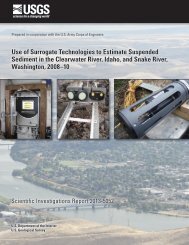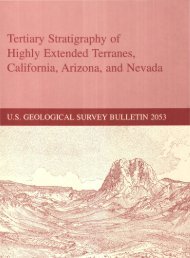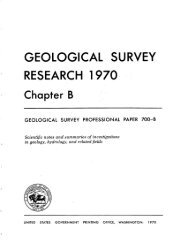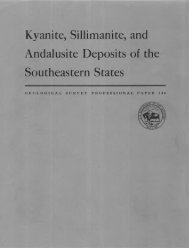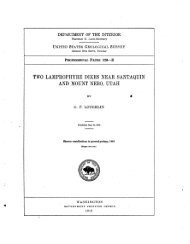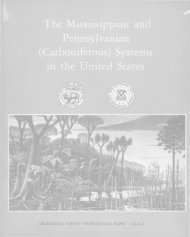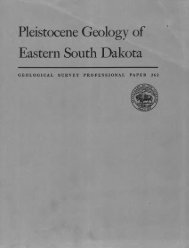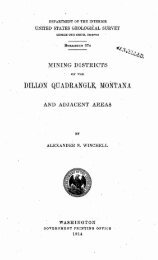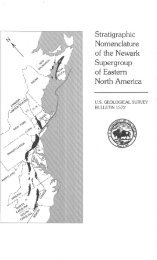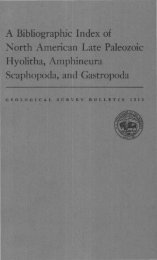GROUND WATER IN NORTH-CENTRAL TENNESSEE
GROUND WATER IN NORTH-CENTRAL TENNESSEE
GROUND WATER IN NORTH-CENTRAL TENNESSEE
You also want an ePaper? Increase the reach of your titles
YUMPU automatically turns print PDFs into web optimized ePapers that Google loves.
102 <strong>GROUND</strong> <strong>WATER</strong> <strong>IN</strong> <strong>NORTH</strong>-<strong>CENTRAL</strong> <strong>TENNESSEE</strong><br />
Moderate quantities of sodium and potassium have little effect on<br />
the suitability of a water for ordinary household use, inasmuch as<br />
the salts of these elements do not impart hardness to the water. If<br />
these constituents sum up to much more than 100 parts per million,<br />
a water is likely to foam if used in a steam boiler unless it is conditioned<br />
to prevent this reaction. Most of the ground water of north-central<br />
Tennessee will cause little or no trouble in this way. More than<br />
400 parts per million of sodium and potassium in a water make it<br />
practically useless as boiler feed without preliminary conditioning.<br />
Some natural waters contain so large quantities of sodium salts that<br />
they are injurious to vegetation to which they may be applied, the<br />
quantity that will be injurious depending upon the species of vegeta<br />
tion, the type of soil, and the drainage. The connate ground waters<br />
of north-central Tennessee are generally so concentrated in sodium<br />
and potassium as to be toxic to vegetation and hence can not be used<br />
for watering crops and sprinkling lawns.<br />
Carbonate and bicarbonate. The carbonate (CO3) and bicarbonate<br />
(HCO3) in natural waters are derived by the solution of rock-forming<br />
carbonate minerals largely through the action of carbon dioxide or<br />
natural acids in the waters. Carbonate is not present in appreciable<br />
quantities in most natural waters. All the rocks of north-central<br />
Tennessee contain carbonate minerals in abundance, and the asso<br />
ciated ground waters are generally rather concentrated in bicarbonate.<br />
Those of the representative samples that are moderately concentrated<br />
contain from 30 to 400 or more parts per million of bicarbonate;<br />
approximately half of them contain between 150 and 250 parts per<br />
million. The bicarbonate as such has little effect on the use of a<br />
water.<br />
Sulphate.' Sulphate (SO4) in ground waters may be derived from<br />
gypsum (calcium sulphate) associated with limestone and other<br />
rocks, from the oxidation products of pyrite (iron disulphide) and<br />
other sulphides, or from concentrated or desiccated brines inclosed<br />
by marine sediments. The ground waters of north-central Tennessee<br />
appear to have acquired sulphate from each of these sources. In<br />
the moderately concentrated waters of this region sulphate is gener<br />
ally less abundant than bicarbonate, its approximate range being<br />
from 2.5 to 350 parts per million; in two-thirds of them it is less than<br />
25 parts per million. In most of the highly concentrated waters,<br />
however, sulphate is more abundant than bicarbonate and may be<br />
several thousand parts per million, as in analyses 260, 294, 311, 326,<br />
and 390 (pp. 114-117).<br />
The sulphates of sodium or magnesium if present in sufficient<br />
quantity impart a bitter taste to water and may render it otherwise<br />
unfit for domestic use. Several of the more concentrated waters of



